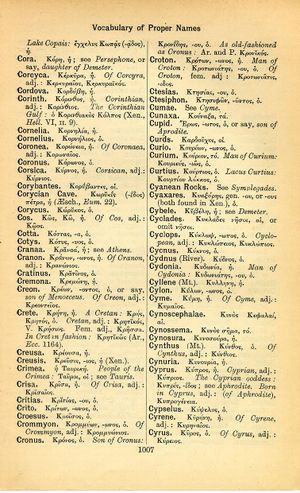Corsica
Οὐ γὰρ ἀργίας ὤνιον ἡ ὑγίεια καὶ ἀπραξίας, ἅ γε δὴ μέγιστα κακῶν ταῖς νόσοις πρόσεστι, καὶ οὐδὲν διαφέρει τοῦ τὰ ὄμματα τῷ μὴ διαβλέπειν καὶ τὴν φωνὴν τῷ μὴ φθέγγεσθαι φυλάττοντος ὁ τὴν ὑγίειαν ἀχρηστίᾳ καὶ ἡσυχίᾳ σῴζειν οἰόμενος → For health is not to be purchased by idleness and inactivity, which are the greatest evils attendant on sickness, and the man who thinks to conserve his health by uselessness and ease does not differ from him who guards his eyes by not seeing, and his voice by not speaking
English > Greek (Woodhouse)
Κύρνος, ἡ.
Corsican, adj.: Κύρνιος.
Latin > English (Lewis & Short)
Corsĭca: ae (Corsis, ĭdis, Prisc. Perieg. 470), f. (among the Greeks, Κύρνος, Κορσίς),
I the island Corsica, in the Mediterranean Sea, renowned in ancient times for the honey and wax of wild bees; the place of banishment of Seneca the philosopher, Liv. Epit. 17; Sen. Cons. Helv. 6, 2; Tac. H. 2, 16; Mel. 2, 7, 19; Plin. 3, 6, 12, § 80; Monum. Scip. ap. Inscr. Orell. 552; Cic. N. D. 3, 20, 52 al.—
II Hence adjj.
A Cor-sus, a, um, Corsican, Ov. F. 6, 194.—In plur.: Corsi, ōrum, m., the Corsicans, Liv. 42, 7, 1 and 2; Plin. 15, 29, 38, § 126.— Also, a people that migrated from Corsica into northern Sardinia, Plin. 3, 7, 13, § 85. —
B Corsĭcus, a, um, Corsican: litora, Manil. 4, 636: apis, Ov. Am. 1, 12, 10: mel, Plin. 30, 4, 10, § 28: cera, id. 21, 14, 49, § 84. —
C Corsĭcānus, a, um, Corsican: ager, Sol. 3: mella, Serv. ad Verg. E. 9, 30; id. G. 4, 101.
Latin > French (Gaffiot 2016)
Corsĭca,¹⁴ æ, f., Plin. 8, 199, et Corsis, ĭdis, f., Prisc. Perieg. 471, la Corse

